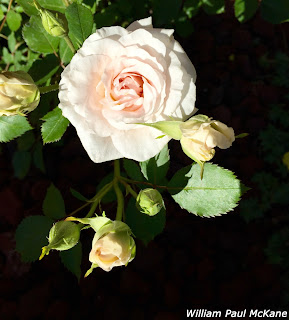 |
| Zoe and Moses thanking God |
Most of us love Christmas. We all have so many joyful memories of
Christmases past, hopes for Christmas this year, and for years to come, God
willing. We delight in so much—or most
of us may take delight in these things:
cold, fresh air; snow that blankets and quiets the earth; bright stars
twinkling—or dancing if we drank some nog—in the icy-cold December sky; sleigh
bells and Christmas carols; trees and homes decorated with lovely lights; children’s
faces aglow with expectation and wonder; Santa traveling far and wide in a
single night or two (for the Orthodox, he comes for Epiphany in early January);
scented candles, cookies and breads baking; delicious dinners lovingly prepared
and eaten among family and friends; a baby waiting for milk and loving
hugs. And Mary and Joseph, now in humble
statue form, surrounded by their resting creature-friends, receiving with sheer
delight the infant Jesus; and the shepherds, the poor of the land, hastening to
the stable to behold the Savior who will be “great joy for all peoples.” And for more than 1500 years now, Christmas
has been for Christians the Mass of the birth of our Lord Jesus Christ, Son of
the living God, humankind’s Savior.
Christmas is all of this, and
more: more than words can readily or
well express, but which we may feel, or sense, because the More is always
pressing in on us. As T. S. Eliot put it
so well in his poetic masterpiece, “The Four Quartets”: “The hint half guessed, the gift half
understood, is Incarnation.” Not only the Incarnation of God the Word as
Jesus of Nazareth, but the process of Incarnation in every moment: God infusing human beings with his divine
presence. This process is at least as
old as recorded human history, for the awareness of this process forms the
decisive spiritual experience of millions of human beings over many centuries
and in highly diverse cultures. The ways
to express the inbreathing of God into human consciousness vary highly, but the
fundamental experience is what it always was.
And what is this experience that we celebrate on Christmas, and at every
Mass, and in so many prayers and meditations throughout the world?
The Apostle Paul expressed the
fundamental experience of divine Incarnation very well: “Now I live, yet not I, but Christ lives in
me.” A human being who can embrace and
do evil is also capable of receiving God into his heart and mind. “Have I been with you so long, and yet you do
not know me?” Jesus asks his disciple, Philip.
Mystics throughout the ages, and mystical philosophers, have spent hours
in silent meditation to experience and then to share in words, in literature,
or in art, the incarnational reality: “I AM with you.”
The birth of Jesus by no means
exhausts the meaning and gift of Christmas.
Rather, in Jesus we see the fullness of what every human being is and
can be. We see humankind in the light of
divine reality: here, now, in every moment,
“I AM with you to deliver you.” Our
hearts can take renewed hope, our spirits soar with joy, because the LORD God
is dwelling in and with His people. What
has been true for centuries, now reaches fulfillment and bursts into God’s
promise for each and for all. The
senselessness of life apart from God is overcome, as God enters into the life
of every human being—even in the unbeliever, the “infidel,” the unworthy, the
unscrupulous, the “untouchable,” the “unredeemable.” God has taken into himself every human being,
from the moment of conception through death, into eternity. “God loves us, not because we are good, but
because He IS.” The lover and the
beloved become one in Incarnation. This
sacred marriage of God and human being is what we celebrate, not only on
Christmas, but in every breath we take—whether consciously or not.
Our thoughts return to the
manger—the scene first described by the evangelist Luke, then made physical for
us in the crèche introduced by St. Francis of Assisi—a man in whom God’s
presence could be seen, heard, touched—a man whom animals loved to be near,
because they, too, know their LORD: O
magnum mysterium: “O great mystery,
and wonderful sacrament, that animals should see the new-born Lord, lying in a
manger! Blessed is the Virgin whose womb
was worthy to bear our Savior, Jesus Christ.
Alleluia!”
Merry Christmas, and God bless
and fill us, everyone!








